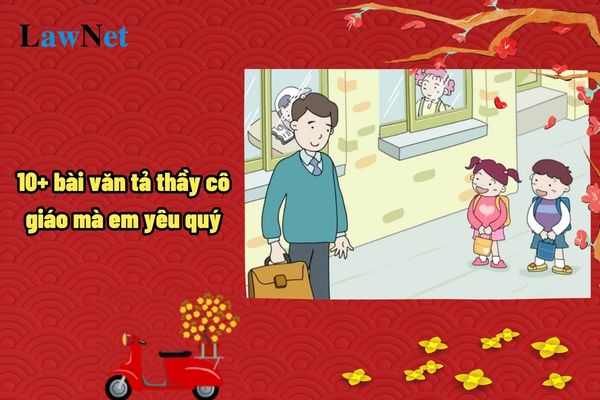What are the 10+ sample descriptive essays on beloved teachers? What are the specific competencies required after completing the 5th-grade Vietnamese Language curriculum?
What are the 10+ sample descriptive essays on beloved teachers?
5th-grade students can refer to the following 10+ sample descriptive essays on beloved teachers:
|
10+ sample descriptive essays on beloved teachers Sample 1: Strict yet Warm Teacher |
*Note: The information is for reference./.

What are the 10+ sample descriptive essays on beloved teachers? What are the specific competencies required after completing the 5th-grade Vietnamese Language curriculum? (Image from the Internet)
What are the objectives of the 5th-grade Vietnamese Language curriculum?
Under Section 3 of the General Education Program for Literature issued together with Circular 32/2018/TT-BGDDT, the curriculum objectives are as follows:
- General objectives for the 5th-grade Vietnamese Language curriculum:
+ Develop and nurture essential qualities in students: patriotism, kindness, diligence, honesty, and responsibility; to cultivate the soul, shape character, and develop individuality.
The Literature subject helps students explore themselves and the world around them, understand people, possess a rich spiritual life, have a humane approach to life and interactions; have a love for the Vietnamese Language and literature; be conscious of the origin and identity of the nation, contributing to preserving and developing Vietnamese cultural values; be open to cultural quintessence of humanity and have the ability to integrate internationally.
+ Contribute to helping students develop common capacities: autonomy and self-learning ability, communication and cooperation skills, problem-solving, and creativity.
Specifically, the Literature subject helps students develop language and literary skills: practice reading, writing, speaking, and listening skills; have a foundational system of popular knowledge about the Vietnamese Language and literature, develop figurative and logical thinking, contributing to the formation of basic literacy of a cultured person; know how to create common texts; know how to receive and evaluate literary texts specifically, communication products, and aesthetic values in general in life.
- At the primary level
+ Help students form and develop key qualities with specific manifestations: love for nature, family, and homeland; awareness of origin; appreciation for beauty and goodness, and having healthy emotions; enthusiasm for learning, and working; honesty and straightforwardness in learning and life; awareness of responsibilities to oneself, family, society, and the surrounding environment.
+ Help students initially form common capacities, develop language skills in all reading, writing, speaking, and listening skills at a basic level: correct, fluent reading of texts; understanding the content and main information of a text; relate, compare outside the text; correct spelling, grammar; able to write several sentences, paragraphs, short essays (mainly narrative and descriptive essays); articulate presentation; listening and understanding others' speeches.
Develop literary skills with requirements to distinguish poetry from stories, know how to read poetry and stories; recognize the beauty of artistic language; have imagination, comprehend, and be moved by the beauty and goodness of people and the world depicted in literary texts.
What are the specific competencies required after completing the 5th-grade Vietnamese Language curriculum?
According to Section 4 of the General Education Program for Literature issued together with Circular 32/2018/TT-BGDDT, the specific competencies required after completing the 5th-grade Vietnamese Language curriculum are as follows:
- Requirements at the primary level:
+ Language competency
Read correctly, fluently, and expressively; understand the main content of a text, primarily explicit content; initially understand implicit content like the theme and lessons from the text.
At the primary level, reading requirements include technical reading and comprehension skills. For lower-grade students (grades 1 and 2), the emphasis is on reading correctly with an appropriate speed and understanding simple content. For grades 3, 4, and 5, more focus is put on comprehending specific content and understanding themes, and lessons from the text.
From grades 1 to 3, write correct spelling, vocabulary, and grammar; write several sentences, sand hort paragraphs; in grades 4 and 5, begin writing short complete essays, primarily narrative, descriptive, and simple introductions.
Write texts recounting stories already read, witnessed, participated in, stories imagined by students; describe familiar objects and phenomena; introduce objects and activities close to students' lives.
Write paragraphs expressing emotions and thoughts when reading a story or poem or witnessing an event that evokes many emotions; express opinions on simple issues in learning and life; write some common text types such as autobiographies, messages, invitations, schedules, applications; initially know how to write according to the process; the text should have three parts (introduction, body, conclusion).
Present ideas and emotions clearly; initially know how to use appropriate gestures when speaking; retell clearly stories read or heard; share and exchange emotions, attitudes, and thoughts about discussed issues; know how to explain an object or simple process.
Listen with suitable attitudes and grasp essential content; recognize the speaker's emotions; know how to respond to what is heard.
+ Literary competency
Differentiate narrative and poetry texts (prose and verse); recognize content and attitude and feelings of the writer in texts; initially understand the effects of some literary forms (language, characters, plot, rhyme, comparison, personification).
Know how to imagine, create, and express literary qualities in writing and speaking.
For grades 1 and 2: recognize who and what the text is about; identify characters in stories, rhymes in poetry; recognize poetry and stories.
For grades 3, 4, and 5: know how to read literature expressively; retell or summarize the main content of a story or poem; comment on characters, events, and the writer's attitude in texts; identify time and setting, rhyme patterns, poetic rhythms, beautiful and unique language, and the effects of personification and comparison.
Understand the meaning or lessons drawn from the text. Write anecdotes or descriptive essays expressing emotions and imaginative capacity.

